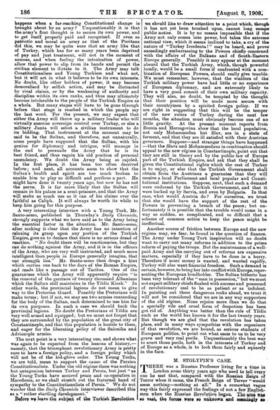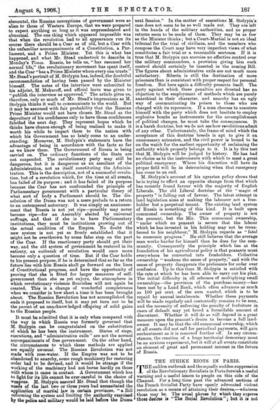STOLYPIN'S CASE.
MHERE was a Russian Professor living for a time in Iondou some thirty years ago who used to toll eTgri one he ruet that, compared with the Russian Reign of Terror when it came, the French Reign. of Terror "would seem nothing—nothing at all." In a somewhat vague way this fairly expressed the feelings of not a few g4glis4- papa op the A' ApTolutio4 1:)egait1 Tile lire § 'SW IQ vott 019 1941;41 WWI 59 lailkilgwa.and ausimiligly so elemental, the Rnsidan conceptions of government were so alien to those of Western Europe, that we were prepared to expect a,nything so long as it was unprecedented and abnormal. The one thing which appeared impossible was that when the revolution had to all appearance run its course there should be a Czar as of old, but a Czar with the unfamiliar accompaniments of a Constitution, a Par- liament, and a Prime Miniater. Yet this is what has happened, and what Mr. Stead undertook to describe in Monday's Times. Russia, he tells us, "has resumed her normal life," the revolutionary movement has spent itself, and the Czar "has of Prime Minister whom every one trusts." Mr. Stead's portrait of M. Stolypin has, indeed, the doubtful recommendation of having been passed by the Minister himself. The notes of the interview were submitted to his adjoint, M. Makaroff, and official leave was given to "publish the interview as approved." The article gives us, therefore, only so much of Mr. Stead's impressions as M. Stolypin thinks it well to communicate to the world. But it may be assumed with fair probability that the Russian Prime Minister would not have chosen Mr. Stead as the depositary of his confidences only to have those confidences falsified the next day. They represent hopes which he thinks have chance enough of being realised to make it worth his while to impart them to the nation with which his Government has so lately come to an under- standing. Moreover, M. Stolypin's statements have the advantage of being in accordance with the facts so far as we know them. The Government of Russia is being carried on. The ordinary functions of the State are not suspended. The revolutionary party may still be dangerous, but it is dangerous as an assailant of the Administration, not as itself constituting the Adminis- tration. This is the description, not of a successful revolu- tion, but of a revolution which, for the time at all events, has failed of its purpose ; and it has failed of its purpose because the Czar has not confounded the principle of Parliamentary government with a particular theory of what sort of body a Parliament should be. The dis- solution of the Puma was not a mere prelude to a return to an untempered autocracy. It was simply an announce- ment that Russia is not yet ripe—possibly may never become ripe—for an Assembly elected by universal suffrage, and that if she is to have Parliamentary institutions, they must be institutions growing out of the actual condition of the Empire. No doubt the new system is not yet so firmly established that it might not be overthrown by some false step on the part of the Czar. If the reactionary party should get their way, and the old system of government be restored in its entirety, an outbreak of revolution would once more become only a question of time. But if the Czar holds to his present purpose, if he is determined that so far as the future lies with him Russia shall go forward on the lines of Constitutional progress, and have the opportunity of proving that she is fitted for larger measures of self- government than she as yet enjoys, the atmosphere in which revolutionary violence flourishes will not again be created. This is a change of wonderful completeness when we consider in how short a time it has been brought about. The Russian Revolution has not accomplished the ends it proposed to itself, but it may yet turn out to be the parent of an unacknowledged offspring of solid gains to the Russian people.
It must be admitted that it is only when compared with the way in which Russia was formerly governed that M. aolypin can be congratulated on the substitution of which he has been the instrument. States of siege, exeeutiona, and "administrative exile" are not the normal accompaniments of free government. On the other hand, the circumstances to which these methods are applied are equally unusual. The Russian Revolution was not made with rose-water. If the Empire was not to be abandoned to anarchy, some rough machinery for restoring order had to be devised, and it would be strange if the working of the machinery had not borne hardly pp Onion with whom it Wile in contact. 4, (3-overnment which has to fight for its life caunOt be over-careful in the choice of w0Pons. M. Stolypin aasured Mr. Stead that though the needs of the last two or three years had necessitated the application of martial law in certain provinces, " Bill reforming the system and limiting the authority exercised by the police and military would be laid before the Duma next Session." In the matter of executions M. Stolypin's case does not seem to be so well made out. They are left in the hands of the military authorities, and no proper returns seem to be made of them. They may be as few as the Minister thinks ; but a Court-Martial is not an ideal tribunal for the trial of civilians, and the members who compose the Court may have very imperfect views of what constitutes a fair trial or a reasonable sentence. If it is true that M. Stolypin can exercise no effective control over the military commanders, a provision giving him such control should certainly be inserted in the coming Bill. The figures about administrative exile are not much more satisfactory. Siberia is still the destination of more prisoners than is consistent with proper respect for personal freedom. But here again a difficulty presents itself. The party against which these penalties are directed has no objection to the employment of methods which are purely anarchical in their character, and anarchy has an ugly way of communicating its poison to those who are charged with its repression. If a man chooses to associate himself with the party which does not hesitate to employ explosive bombs as instruments for the accomplishment of political changes, he must take the consequences. It is a harsh doctrine, but we do not see how revolutions admit of any other. Unfortunately, the frame of mind which the acceptance of this doctrine breeds is apt to give it an unnecessary extension, and the civil power is bound to be on the watch for the earliest opportunity of reclaiming the authority which properly belongs to it. It is by this teat that M. Stolypin will be judged by history. He has had no choice as to the instruments with which tomeet a great. political emergency. Where his discretion will have its proper field will be in determining when that emergency has come to an end.
M. Stolypin's account of his agrarian policy shows that he is trying to effect an opposite change from that which has recently found favour with the majority of English Liberals. The old Liberal doctrine of the "magic of property" is falling out of favour. The latest attempt in land legislation aims at making the labourer not a free- holder but a perpetual tenant. The existing land system of Russia is something of this kind. It is built upon communal ownership. The owner of property is not the peasant, but the Mir. This communal ownership, "under which no peasant is secure that the labour which he has invested in his holding may not be trans- ferred to his neighbour," M. Stolypin regards as "fatal to economic progress." He still believes that the average man works harder for himself than he does for the com- munity. Consequently the principle which lies at the foundation of his agricultural policy is that peasants must everywhere be converted into freeholders. Collective ownership "weakens the sense of property," and with the sense of property disappears the preference for order over confusion. Up to this time M. Stolypin is satisfied with the rate at which he has been able to carry out his plan. The initial difficulty in all schemes of multiplying small ownerships—the provision of the purchase-money—has been met by a Land Bank, which often advances as much as 100 per cent, of the sum wanted, which is to be repaid by annual instalments. Whether these payments will be made regularly and contentedly remains to be seen, and the necessity of enforcing the penalty of forfeiture in cases of default may yet breed a formidable amount of discontent. Whether it will do so will depend in a great measure upon the peasant's desire to become a full land- owner. It may be that the old communal ownership, which at all events did not call for periodical payments, will gain enchantment as it is removed further off. In any circum- stances, the creation of a huge territorial democracy must be an anxious experiment, but it will at all events constitute an element of great and permanent interest in the future of Russia.



































 Previous page
Previous page